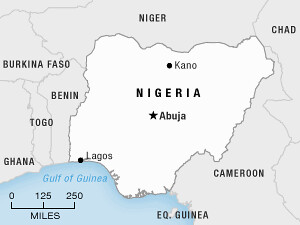
Areas in the West African state of Nigeria where violence has flared again. Dozens have been killed in sectional strife., a photo by Pan-African News Wire File Photos on Flickr.
Nigeria: Child Lead Poisoning Crisis
07 Feb 2012 09:00
Source: Content partner // Human Rights Watch
(Lagos) - Thousands of children in northern Nigeria need immediate medical treatment and dozens of villages remain contaminated two years into the worst lead poisoning epidemic in modern history, Human Rights Watch said today while releasing a video on the issue.
Four hundred children have died, according to official estimates, yet environmental cleanup efforts have not even begun in numerous affected villages.
Artisanal gold mines are found throughout Zamfara State in northwestern Nigeria, and high levels of lead in the earth and the use of rudimentary mining methods have resulted in an epidemic of lead poisoning among children, Human Rights Watch said.
Research by Human Rights Watch in Zamfara in late 2011 found that children are exposed to this lead dust when they process ore in the mines, when their miner relatives return home covered with lead dust, and when the lead-filled ore is manually or mechanically crushed at home. Children can also be exposed to toxic lead in contaminated water and food. Healthcare workers in Zamfara State told Human Rights Watch that there have also been high rates of infertility and miscarriage among affected adults.
"Zamfara's gold brought hope for prosperity, but resulted in death and backbreaking labor for its children," said Babatunde Olugboji, deputy program director at Human Rights Watch. "People living in Zamfara State should not have to trade their lives, or their children's lives, for the chance to mine gold and make a living."
The Zamfara State government, in partnership with international organizations such as Medecins Sans Frontieres and the United States Centers for Disease Control, has treated more than 1,500 children with acute lead poisoning, but thousands more children urgently need the life-saving chelation therapy treatment that removes lead from the body, Human Rights Watch said.
Unless their homes are cleaned up and their relatives have access to safer mining techniques that minimize exposure to lead-contaminated dust, treatment will not be effective as children will be repeatedly re-exposed.
Lead is highly toxic and can interrupt the body's neurological, biological, and cognitive functions. Children are particularly susceptible, and according to the World Health Organization, high levels of lead exposure can cause brain, liver, kidney, nerve, and stomach damage, as well as permanent intellectual and developmental disabilities.
Lead poisoning is rarely fatal, but medical workers in Nigeria reported that the lead concentration in the Zamfara State ore is so toxic that in 2010 in villages such as Abare, Dareta, Duza, Sunke, Tungar Daji, Tungar Guru, and Yargalma, the mortality rate was estimated as high as 40 percent among children who showed symptoms of lead poisoning.
In late 2011, the Zamfara State government took an important step when it put together a clean-up team, Human Rights Watch said.
The team is now cleaning up the largest and most contaminated village, Bagega, which is estimated to have at least 2,000 children in need of treatment. However, the scope of contamination in the region requires a sustained and comprehensive effort that will be difficult for the state government to manage without adequate funds, personnel, and expertise.
"For the past two months we've seen a renewed state government commitment to cleaning up heavily lead-contaminated areas in Zamfara," Olugboji said. "This effort needs to be sustained and expanded, and international donors should help ensure that all affected children and villages are reached."
Children as young as 8 work in Zamfara's informal mining sector, dropping down into the mines, processing the ore, using mercury to extract the gold, and selling goods at the processing site. Much of this work, which can be extremely hazardous, qualifies as among the worst forms of child labor under international law, Human Rights Watch said.
Nigeria is party to the International Covenant on Economic, Social and Cultural Rights and to the Convention on the Rights of the Child.
Both treaties obligate Nigeria to protect the health of its children and to ensure their physical and mental development to the maximum extent possible. Nigeria has also ratified International Labor Organization Convention No. 182 on the worst forms of child labor, which protects children from hazardous labor, such as exposure to hazardous substances, agents, or processes.
"By failing to address this epidemic, the Nigerian government is needlessly sacrificing its children," Olugboji said. "The federal and state governments need to educate people about the risks of lead, put safer mining programs in place, end child labor in gold mining, and dramatically expand treatment and environmental cleanup programs."
No comments:
Post a Comment